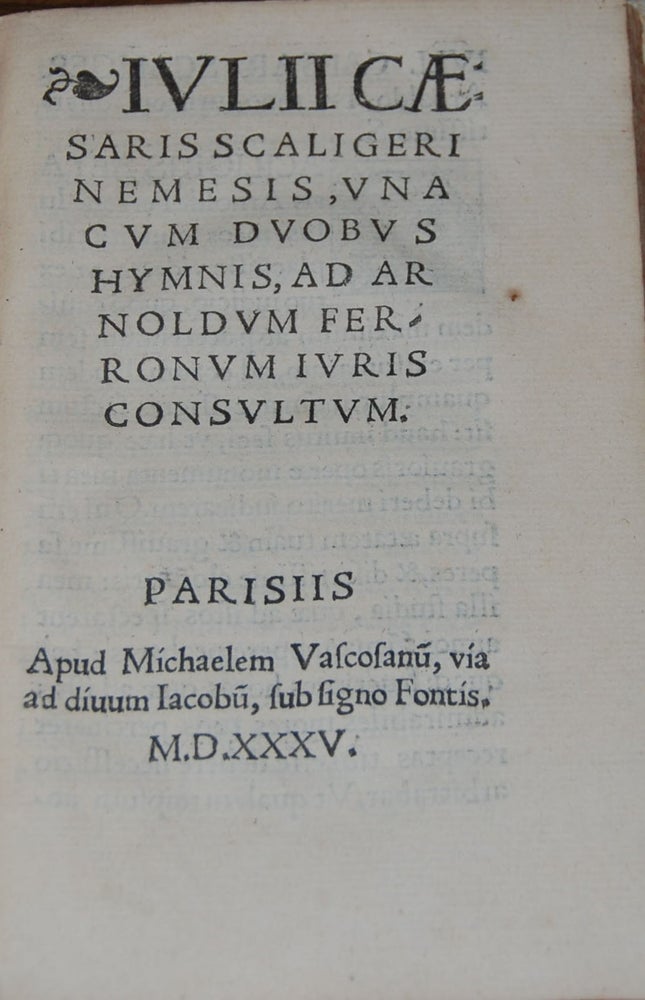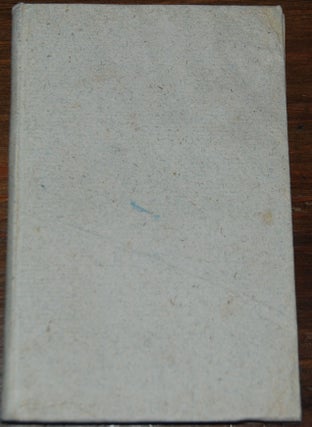NEMESIS; una cum duobus hymnis, ad Arnoldum Ferronum iuris consultum
Paris: Michel Vascosan, 1535. First Edition. 8vo, [24] leaves; text in italic; historiated woodcut initials. BOUND WITH: SCALIGER, LACRYMAE, Prosopopoeia Christianissimi Francorum Regis Francisci Valesii. Paris: Vascosan, 1534. 29, [1] p., [1] blank leaf; text in italic; historiated woodcut initials. The two works bound together in modern boards; a few inoffensive faint dampstains o/w a very nice clean copy. Quite rare: the only copy of the Lacrymae in America is at Harvard, while the Nemesis is represented by two copies (Newberry and U. of Illinois). § Moreau IV, nos. 1418 and 1139; Cioranesco 20500 and 20499; M. Magnien, "Jules-César Scaliger et ses imprimeurs," Bibliothèque d'Humanisme et Renaissance, XLIV (1982), pp. 314 and 313. Item #47428
First editions of two of the earliest Neo-Latin verse productions by the celebrated humanist Julius Caesar Scaliger (1484-1558), father of the even more celebrated Joseph Scaliger. Scaliger was an Italian scholar and physician spending a major part of his career in France. He was the first to attempt a systematic treatise on poetry: "Poetices Libri Septem" (Geneva, 1561; Leyden, 1581; Heidelberg, 1607). The general principles of this work are derived from Aristotle whom he calls "imperator noster; omnium bonarum artium dictator perpetuus". Like Aristotle he makes imitation the basis of all poetry. As a physician he was much interested in botany and wrote commentaries on the treatises on plants of Theophrastes and Aristotle. In the iambic poem Nemesis Scaliger imitated the didactic poem Manto by Angelo Poliziano, a poem (first published in 1482) in which the prophetess Manto foretold the future greatness of Virgil. Following the Nemesis are two iambic hymns, one to God the Father, the other to the Virgin of Agen (the town where Scaliger had settled after leaving his native Italy). Both the Nemesis and the hymns are introduced by substantial dedicatory prefaces addressed to the then 20-year old jurist and future historian and Counsel of the Bordeaux Parlement, Arnoul Le Ferron (1515-1563). The Lacrymae ("Tears") are elegiacs on the death of famous contemporaries, including the Duke of Longueville, killed at the Battle of Pavia; the final poem is a dirge on the death of Scaliger's own two-year old daughter Margarita (Margaritae Scaligerae filiolae bimulae acerbum interitum deflet). The Lacrymae are preceded by two dedicatory prefaces: the first addressed to printer Michel Vascosan, the other to the prominent scholar and Neo-Latin poet Nicolas Bourbon (1503-1550).
Price: $4,000.00 save 20% $3,200.00



